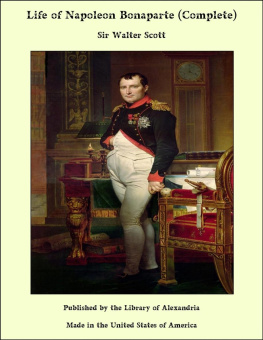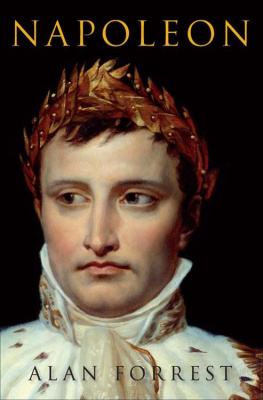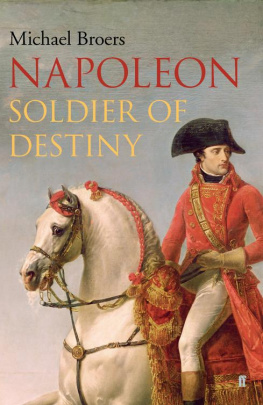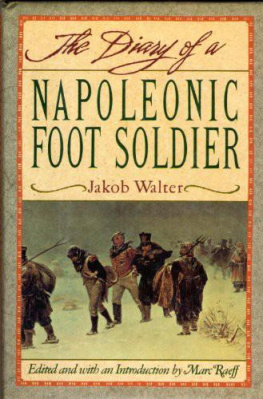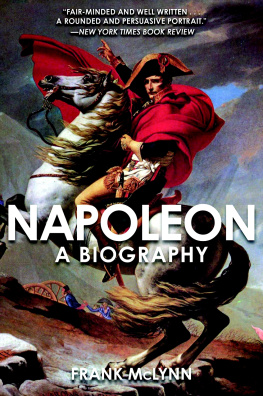
This edition is published by FRIEDLAND BOOKS www.pp-publishing.com
To join our mailing list for new titles or for issues with our books friedlandbooks@gmail.com
Or on Facebook
Text originally published in 1927 under the same title.
Friedland Books 2017, all rights reserved. No part of this publication may be reproduced, stored in a retrieval system or transmitted by any means, electrical, mechanical or otherwise without the written permission of the copyright holder.
Publishers Note
Although in most cases we have retained the Authors original spelling and grammar to authentically reproduce the work of the Author and the original intent of such material, some additional notes and clarifications have been added for the modern readers benefit.
We have also made every effort to include all maps and illustrations of the original edition the limitations of formatting do not allow of including larger maps, we will upload as many of these maps as possible.
NAPOLEON AND HIS FAMILY
The Story of a Corsican Clan
by
WALTER GEER
Vol. I CORSICA-MADRID 1769-1809
TABLE OF CONTENTS
Contents
TABLE OF CONTENTS
NAPOLEON, FIRST CONSUL
FOREWORD
JEAN-JACQUES Rousseau says in mile: Without altering a historical fact, but by extending or contracting the circumstances bearing upon it, how many aspects one can give it! The same object, placed at different points of view, will hardly seem the same; and yet nothing has changed except the eye of the spectator.
It is impossible to understand fully the drama of the life of Napoleon without taking into consideration two factors, practically ignored by historians, which had a decisive bearing upon his career: his physical heritage, and the influence of his family.
In his bulletins and correspondence, Napoleon always endeavored to convey the impression that he was constantly in excellent health. This, however, was far from being true, and his physical condition, during his later campaigns, as first pointed out by Lord Wolseley, was largely the cause of his failure.
The fame of Napoleon has so overshadowed that of his brothers and sisters that their influence on his career has generally been overlooked. Without disregarding the other cause, which was largely beyond his control, it may be said that the downfall of Napoleon was mainly due to the members of his family, whom he had raised so high, who by their shortcomings and their transgressions became the agents of his decline. Their acts were frequently beyond his control, without his authority, and contrary to his wishes; but they were so by virtue of the powers which he had delegated, of the system which he himself had established for the government of his Empire.
We propose to set forth in these pages the part for which the Family was responsible in the events which brought about the crumbling of the highest fortune that the world has ever seen upraised; in the downfall of the man the best endowed by nature, the best served by Destiny, that History has ever known.
In this drama of Napoleon and His Family there are over twenty persons who take the subordinate roles, and occupy the stage beside the principal actor, but the character of Napoleon dominates the entire play. It is necessary to bring on the scene his father and mother, his uncle (Fesch), his brothers and sisters, with their respective consorts, as well as his adopted son (Eugne) and his wife; and to present many facts which derive their main interest from their bearing upon the career of the star performer.
This, then, is not a life of Napoleon: not a history of his campaigns: not a record of his civil administrationit is only the story of the Family, as it influenced his designs, his acts, and his destiny.
WALTER GEER
NEW YORK,
September, 1927.
ILLUSTRATIONS
Napoleon/First Consul
Carlo Buonaparte
Bonaparte (sketch by David)
Josphine (sketch by David)
General Bonaparte
Chteau of Malmaison
Prince Camillo Borghse
Miss Patterson (by Stuart)
Josphine at Malmaison
King Louis
Letitia Bonaparte
Pauline Bonaparte
Queen Hortense
Joseph Bonaparte
PLANS
The Tuileries (map)
The Tuileries (sketch)
DRAMATIS PERSON
CHARLES, the father
LETITIA, Madame Mre , the mother
JOSEPH, (King of Naples), King of Spain
JULIE CLARY, his wife
NAPOLEON, Emperor of the French
JOSEPHINE DE BEAUHARNAIS, his first wife
MARIE-LOUISE, his second wife
LUCIEN, Prince of Canino (in Italy)
CATHERINE BOYER, his first wife
MADAME JOUBERTHOU, his second wife
LOUIS, King of Holland
HORTENSE DE BEAUHARNAIS, his wife
JEROME, King of Westphalia
ELIZABETH PATTERSON, his first wife
CATHERINE OF WRTTEMBERG, his second wife
ELISA, Grand-Duchess of Tuscany
PAULINE, Princesse Borghse
CAROLINE, Queen of Naples
MURAT, King of Naples
EUGENE DE BEAUHARNAIS, Viceroy of Italy
AUGUSTA OF BAVARIA, his wife
CARDINAL FESCH, Grand-Almoner
CHAPTER ONE: 1769-1793
THE FAMILY IN CORSICA
The Bonaparte AncestryEmigration to CorsicaNapoleons ParentsBirths of Joseph and NapoleonDoubts Regarding the DatesThe Bonaparte MansionNapoleons Earlier YearsBrienne and the Military SchoolDeath of Charles BonaparteThe AutopsyNapoleon Enters the ArmyCong in CorsicaPoverty of His FamilyJosephs CharacterNapoleons Visit to ParisHis Amorous AdventureStationed at AuxonneSecond LeaveBrings Louis to FrancePromoted and Ordered to ValenceThird CongDeath of Uncle LucienNapoleon Elected Officer of Corsican VolunteersSecond Visit to ParisSees Attacks on the TuileriesRestored to Army as CaptainAccompanies lisa to CorsicaThe Madelena FiascoThe Family Flees to France
IN HIS temperament, his instincts, his faculties, his imagination, his passions, his morals, Napoleon was so different from his countrymen and his contemporaries, writes Monsieur Taine, that he seemed cast in a different mould, and composed of another metal. Manifestly, he was neither a Frenchman, nor a man of the eighteenth century: he belonged to another race and another age. {1}
Of the remote ancestors of Napoleon, we know little more than their names, and the official positions that they held. The Bonaparte family has been the subject of controversy from first to last, but careful research has dispelled the romances of many of the earlier writers, and connected the stock with a Florentine named William, who in the year 1261 took the name of Buonaparte, {2} which Napoleon later Gallicized by dropping the u. Napoleon never denied his Italian origin; and that he preferred Bonaparte to Bonaparte is a matter of no consequence. As Masson very justly remarks, One might as well reproach him for not sounding the final e of his name. {3}
William seems to have been involved in the unceasing strifes which rent the civic life of Florence, and when the Guelfs gained the ascendancy, he sought refuge in the Tuscan village of Sarzana, beyond the reach of the victorious faction. Here the family lived for nearly three centuries. As nearly as one can judge, they were in moderate circumstances, and their fortune was diminished rather than augmented in successive generations. They held various civil and military positions, but did not engage in business. They owned some estates, with cattle and vineyards; and town and country mansions, where they lived comfortably upon their rents, and the produce of their farms. {4}





